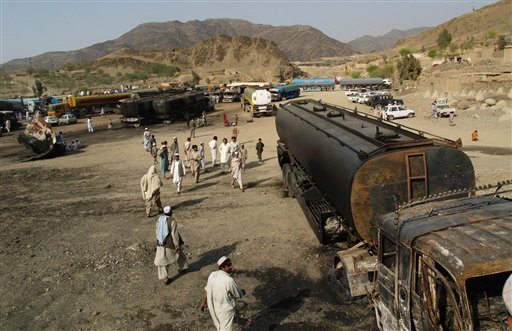Pakistan welcomed a NATO invitation Tuesday to attend key talks on the future of Afghanistan in Chicago next week but remained non-committal on ending a nearly six-month blockade on supply routes.
NATO Secretary General Anders Fogh Rasmussen telephoned President Asif Ali Zardari to invite him to the May 20-21 summit, a day after Pakistan’s foreign minister said it was time to “move on” after US air strikes killed 24 soldiers last November.
Islamabad shut its Afghan border crossings to NATO supplies after the deaths and its relations with the United States, already frayed by the discovery of Osama bin Laden in Pakistan, plunged into their worst ever crisis.
NATO spokeswoman Oana Lungescu said Pakistan had “an important role” to play in the future of Afghanistan, which will be the focus of the second day of the summit.
“We’re working very closely with Pakistan to allow the opening of the transit line because obviously this is in everybody’s interest,” she said.
Nadeem Hotiana, a spokesman for Pakistan’s embassy in Washington, said Zardari was “likely” to travel to Chicago for the summit.
Pakistan’s involvement in the Chicago talks would minimise its international isolation and could boost its leverage over the future of neighbouring Afghanistan, as NATO countries pull out their combat forces by 2014.
The invitation marks a return from the cold for Islamabad, which boycotted the last major international talks on Afghanistan, held in Bonn in December.
The Pakistani parliament has called in vain for an end to US drone strikes targeting Taliban and Al-Qaeda militants on its soil, and a formal US apology for the November air strikes.
Analysts say Pakistan has no choice but to reopen the border as US cash is needed to help boost its meagre state coffers, at a time when major NATO discussions are under way affecting its own strategic future.
A cabinet committee led by Prime Minister Yousuf Raza Gilani met on Tuesday evening to discuss whether the NATO supply lines into Afghanistan, closed since November, should be reopened, but remained non-committal.
“No final decision has been taken,” Information Minister Qamar Zaman Kaira told AFP.
“We want solutions of the problems and it is in line with this policy that we are trying to sort out the issue,” he said without putting a time frame on the decision.
Sources familiar with the discussions earlier told AFP the government had effectively decided to end the blockade, probably by the beginning of next week.
But an official statement said the committee was considering imposing a precondition “to the effect that only non-lethal cargo would be allowed to transit through Pakistan to Afghanistan”.
It said Pakistan would “continue to remain engaged with the US on the question of apology (for the November strikes) and cessation of drone attacks”.
The United States has also guaranteed payment of at least $1.1 billion should the borders reopen, as compensation for fighting militants, one source told AFP.
Pakistan previously negotiated a fee of $160 per 40-foot container and is now looking to secure anywhere from $320 to $500, although the figure has yet to be agreed, the source added.
Foreign Minister Hina Rabbani Khar said on Monday that Pakistan had made its point and that “we now need to move on and go into a positive zone and try to conduct our relations.”
The US State Department said both countries had made “considerable progress” on ending the blockade, which has halted fuel and supply trucks from the port city of Karachi in the south to two Afghan border crossings.
“We will continue to work on this throughout the week. Obviously, it’ll be a wonderful signal if we can get it done by the time of the summit,” State Department spokeswoman Victoria Nuland said.
The United States has made increasing use of more expensive routes into northern Afghanistan and the Pakistan supply routes constitute as little as 25 percent of what NATO needs to sustain itself in its nearly 11-year fight against the Taliban.
Mir Mohammad Yousuf Shahwani, chairman of the All Pakistan Oil Tanker Owners Association, told AFP he had been informed by a senior official in the petroleum ministry that Pakistan would reopen the supply line within days.










